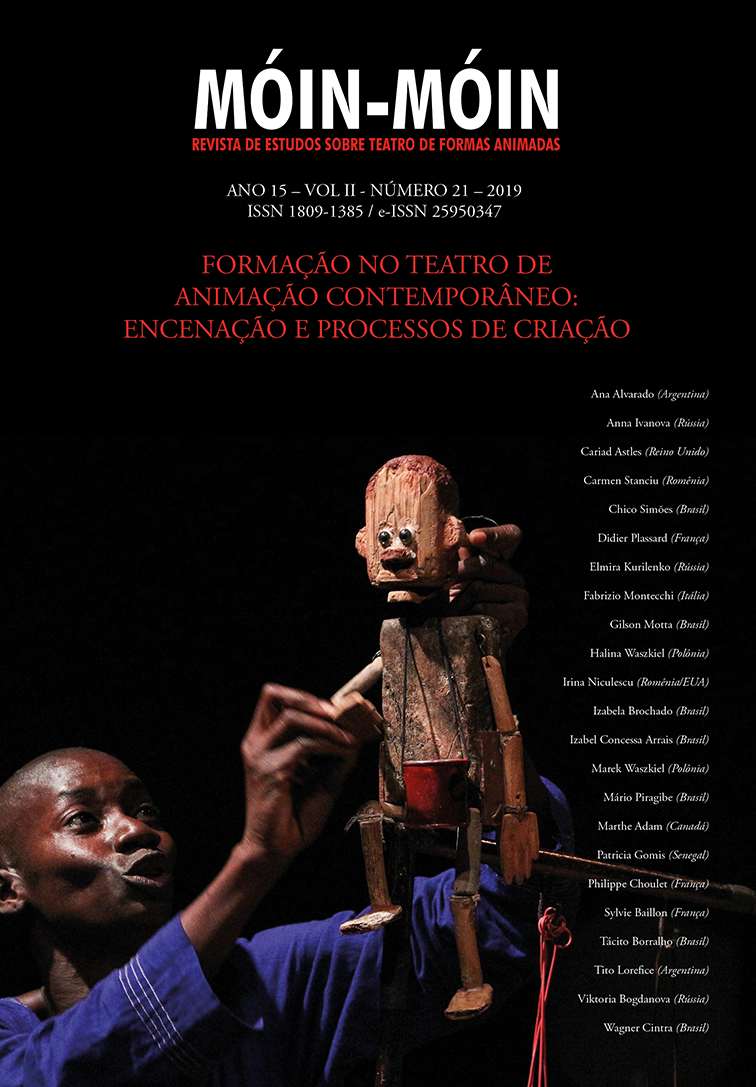The director in puppet theatre (Eastern European context)
DOI:
https://doi.org/10.5965/2595034702212019063Abstract
In Poland, as well in the East European countries, puppet theatres of the second half of the 20th century, and it seems that also in that of the first quarter of the 21st century, the most important person is a director. Was it always so that puppet theatre equals the director? So, the objectives of this study is to determine this problem. It was only in the beginning of 20th century, in the period of the great reform of theatre, that the director was given unlimited competencies. In puppet theatre this process lasted much longer, because the classical style of theatre organization, derived from unaccompanied and private enterprises of particular creators, also endured for longer. Today, it is a director who rules supreme in a puppet theatre. In practice, Polish directors are still convinced today that theatre is intended to tell stories. is process limited puppetry as an independently existing art based primarily on the abilities of the craftsmen; on the miracle of animating a lifeless object, a puppet, whose magical life has so much to offer the spectators. On the contrary, axis of this process stand the artists who see the meaning of their theatrical expression in bring lifeless matter to life. This – when puppet theatre is, after all, a show; it is visual art in motion, not storytelling.Downloads
Downloads
Published
How to Cite
Issue
Section
License
Copyright (c) 2019 Móin- Móin - Revista de Estudos sobre teatro de Formas Animadas

This work is licensed under a Creative Commons Attribution 4.0 International License.
The readers are free to transfer, print and use the articles published in the Magazine, as long as there’s explicit mention to the author(s) and to Móin-Móin Magazine - Studies in Theater of Animated Forms and there are no changes on the original work. Any other use of the texts needs to be approved by the author(s) and the Magazine. In submitting an article to Móin-Móin Magazine - Studies in Theater of Animated Forms and have it approved, the author(s) agree to give away, without payments, the following rights to the Magazine: first publishing rights and the license for the Magazine to redistribute this article and its metadata to index and reference services that the editors consider appropriate.
The articles whose author(s) are identified represent the author’s point of view and not the official position of Móin-Móin Magazine. The author(s) commit to always mention the publication in the following way when publishing work in reference to the article published in Móin-Móin Magazine:
“This article was originally published by Móin-Móin Magazine volume (insert the volume), number (insert the number), in the year of (insert year) and can be accessed on: http://www.revistas.udesc.br/index.php/móin"
Plagiarism in any way constitutes an unethical publishing behavior and is unacceptable. Móin-Móin Magazine holds the right to use software or other plagiarism tracking methods to scan the submitted works.
![]()
This journal uses Attribution-NonCommercial 4.0 International– (CC BY NC 4.0).






